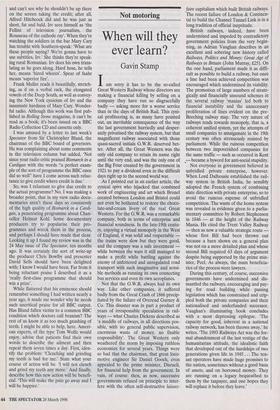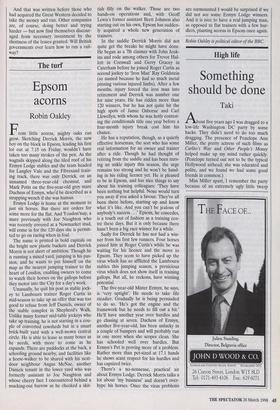Not motoring
When will they ever learn?
Gavin Stamp
Iam sorry it has to be the so-called Great Western Railway whose directors are making a financial killing by selling on a company they have run so disgracefully badly — asking more for a worse service than in the days of British Rail. This cyni- cal profiteering is, as many have pointed out, an inevitable consequence of the way the last government hurriedly and desper- ately privatised the railway system, but that magnificent railway associated with those quasi-sacred initials G.W.R. deserved bet- ter. After all, the Great Western was the only old company to retain its name right until the very end, and was the only one of the Big Four created by the government in 1921 to pay a dividend even in the difficult days right up to the second world war.
As I pointed out in an earlier article, the cynical spivs who hijacked that combined work of engineering and art which Brunel created between London and Bristol could not even be bothered to restore the choco- late-and-cream livery of the real Great Western. For the G.W.R. was a remarkable company, both in terms of enterprise and financial soundness. In the late-19th centu- ry, enjoying a virtual monopoly in the West of England, it was solid and respectable the trains were slow but they were good, and the company was a safe investment while between the wars it still managed to make a profit while battling against the enemy of unfettered and unregulated road transport with such imaginative and sensi- ble methods as running its own connecting bus services and even its own aeroplanes.
Not that the G.W.R. always had its own way. Like other companies, it suffered badly from the Great Crash of 1866 precip- itated by the failure of Overend Gurney & Co. This disaster was in part a product of years of irresponsible speculation in rail- ways — what Charles Dickens described as `a muddle of railways, in all directions pos- sible, with no general public supervision, enormous waste of money, no fixable responsibility'. The Great Western only weathered the storm by imposing ruthless economies for several years. Things were so bad that the chairman, that great loco- motive engineer Sir Daniel Gooch, even appealed to the prime minister, Disraeli, for financial help from the governirient. In vain, of course: then, as now, successive governments refused on principle to inter- fere with the often self-destructive laissez- faire capitalism which built British railways. The recent failure of London & Continen- tal to build the Channel Tunnel Link is in a long tradition of official ineptitude.
British railways, indeed, have been undermined and impeded by contradictory government policies from the very begin- ning, as Adrian Vaughan describes in an excellent and sobering new history called Railways, Politics and Money: Great Age of Railways in Britain (John Murray, £25). On the one hand, parliament made it as diffi- cult as possible to build a railway, but once a line had been achieved competition was encouraged which undermined its viability. The promotion of large numbers of strate- gically and financially unsound schemes in the several railway 'manias' led both to financial instability and the unnecessary proliferation of lines evident on the pre- Beeching railway map. The very nature of railways tends towards monopoly, that is, a coherent unified system, yet the attempts of small companies to amalgamate in the 19th century was often strenuously resisted by parliament. While the ruinous competition between two impoverished companies for the same traffic — such as occurred in Kent became a byword for anti-social stupidity.
Not everyone in government believed in unbridled private enterprise, however. When Lord Dalhousie established the rail- way system in British India, he sensibly adopted the French system of combining state direction with private enterprise, so to avoid the ruinous expense of unbridled competition. The waste of the home system was revealed in evidence given to a parlia- mentary committee by Robert Stephenson in 1846 — at the height of the Railway Mania. He cited the Trent Valley Railway — then as now a valuable strategic route whose first Bill had been thrown out because a barn shown on a general plan was not on a more detailed plan and whose second Bill required 63 days of argument despite being supported by the prime min- ister, Peel. As always, the main beneficia- ries of the process were lawyers.
During this century, of course, successive governments have undermined and dis- mantled the railways, encouraging and pay- ing for road building while passing legislation which has constrained and crip- pled both the private companies and their nationalised and underfunded successor. Vaughan's illuminating book concludes with a most depressing epilogue. 'The capacity for good, inherent in a national railway network, has been thrown away,' he writes. 'The 1993 Railways Act was the for- mal abandonment of the last vestige of the humanitarian attitude, the idealistic faith that developed out of the hardships of two generations given life in 1945 ... The ten- ant operators have made huge promises to the nation, sometimes without a good basis of assets, and on borrowed money. They are running on a legacy bequeathed to them by the taxpayer, and one hopes they will replace it before they leave.' And that was written before those who had acquired the Great Western decided to take the money and run. Other companies are, of course, doing better and trying harder — but now find themselves discour- aged from necessary investment by the shortness of the leases granted. Will British governments ever learn how to run a rail- way?























































 Previous page
Previous page